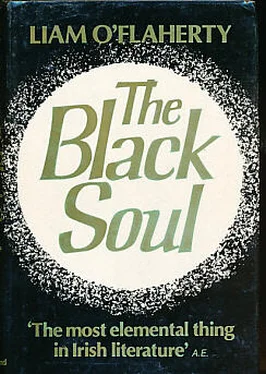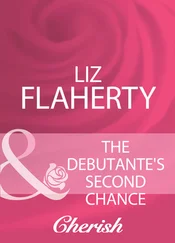The Black Soul by Liam O’Flaherty
To
Edward Garnett
1
In winter all things die. So roared the sea around the shores of Inverara. To the west beyond Rooruck it was black with dim fountains of white foam rising here and there as a wave formed and came towering to the beach. To the north, between Inverara and the mainland, it was white, like the waters of a mountain torrent, white with wide strips of green as if it had got sick and vomited. To the south it was black with a belt of white along the shore beneath the cliffs, where the breakers lashed the rocks. To the east beyond Kilmillick, where the north and south met in the narrow channel athwart the Head of Crom, it was a seething cauldron, hissing like a wounded snake. And around Rooruck it roared in mad delight.
Winter had come. The sea was wrecking all that had generated in spring, flowered in summer and borne fruit in autumn. It tore huge rocks from its bosom and sent them rumbling through the deep. It hurled weeds shorewards in a tumbling mass. They lined the beaches in mounds mixed with sand and the carcases of dogfish. It struck the cliffs monstrous blows that shook them and sent the rockbirds screaming from their clefts. They soared wildly out, their eyes searching the foam for fish.
In winter all things die. So shrieked the wind coming over the sea from the west. It rose from the sea and whirled upwards over the land. It mounted the wall of boulders that protected Rooruck on the west. It skirted the Hill of Fate that guarded Rooruck on the south. It swept eastwards, flying straight in its fury between earth and sky, blasting the earth. The grass was plucked up by the roots. Sheep fled bleating, seeking shelter among the crags. Horses neighed and ran in terror, their nostrils red. The goats wandering on the cliffs snorted and ran eastwards to the hollow beyond Coillnamhan. The fowls in the crops cackled and hid their heads among their feathers. Dogs howled. Pigs grunted and then huddled close together in their straw, whining. Old men sitting by the fires in their cabins shivered and felt that their death was near.
In winter all things die. The rain carried on the wind fell in great black drops that pattered on the crags and rose again in a blue mist. It came from the darkened sky sparse and scattered as if the clouds had been disembowelled in mid-air and only fragments of them had reached the earth terrified. There was no moon. It was hidden by the torn clouds. And the stars shone dimly in twos and threes, scattered over the firmament.
Between two hills, sheltered from the wind and from the sea, lay the seventeen cabins of Rooruck. Their thatched roofs, bound with thick ropes and laden with rocks, shivered but remained intact. The whitewash on their stone walls was blackened. Their doors were buttressed with stones and strips of sacking. Boards nailed into the wooden frames covered the windows. Here and there men stood at their gables leaning against the wind, their legs wide apart, their red lips opened outwards, their yellow teeth bared, their oilskin hats bound around their heads with strings. They shouted to one another from long distances, talking of the storm. Then they would shrug their shoulders, look at their thatch, and go indoors to their fires. Women with their red petticoats thrown over their heads hurried to the well for water. They stopped for a moment with their arms akimbo and their heads bent sideways close together, like birds, talking in awe of the storm and praising God who had not already destroyed them. Then night advanced and the hamlet was still, but for the barking of the frightened dogs.
At the most western point of the hamlet, nearest the shore and the sea, Red John’s cabin lay huddled against the bluff of the hill. Around it the wind only sighed and moaned, for none but stray blasts reached it, blasts that had wandered from the storm, fallen in weariness from the whirling coils that rushed eastwards without pausing for breath. But the sea-spray sometimes struck the door, with a slow falling swish, as of a mountain of loose silk being crushed. The cries of the sea-birds that whirled about it sounded dismally. It was as if the lid were wrenched from the mouth of hell and the wailing of the damned came floating up from the distant caverns. But within there was warmth and peace, heightened by the storm without. In the kitchen a paraffin lamp burned dimly on the wall, its flame smoked with the draught that struck it from the chimney, discolouring the whitewashed wall behind it. On the open hearth a great turf fire burned, fanned by the draught. Its blaze was brighter than the lamp. Sometimes a blue snaky column shot up to lick the soot, that withered before it. The delf on the dresser gleamed in the half-light. Among the sooty rafters, where the earthen covering beneath the thatch hung down in dried lumps, there was darkness. And in the corners shadows seemed to lurk.
Red John sat on a three-legged stool in a corner to the left of the hearth, lighting his clay pipe with a coal that he had taken from the fire in a tongs. His red sunburned cheeks, seen through his red beard, were puffing in and out like a bellows as he sucked at the pipe. Then he dropped the coal into the fire and hit the dog that lay beside him on the hearth with the tongs. The dog whined and looked at him. But presently he sidled up again and stuck his nose in the yellow ashes. He sighed, and the outrush of his breath blew the ashes up on the legs of Red John’s trousers. Red John cursed and struck the dog on the side with his rawhide shoe. The dog yelped and went to the dresser in two bounds. There he curled up and dug his snout into the spot where he had been kicked as if he had a flea, while his little eyes looked at Red John viciously.
Red John’s wife sitting in the opposite corner looked at her husband and curled up her lips. Then she turned to the dog, cracked her fingers and said ‘Poor doggie.’ She did not feel compassion for the cur which she often beat herself, for it was a mangy mongrel. But she favoured it because her husband had kicked it. The cur rose and crept over to her almost on his belly, looking sideways at Red John. He lay by her lap wagging his tail and whining.
‘Huh!’ said Red John as he struck the turf fire with his shoe. His lips opened again to speak, and the tendons of his fingers rose in ridges on the back of his hands as if he were about to strangle his wife, but he neither spoke nor moved. He was afraid to strangle her, afraid even to speak to her. They hardly ever spoke during the five years they were married. And when they spoke, they spoke in hissing monosyllables. Sometimes they sat a whole winter’s evening in silence, peering into the blaze. They hated one another. Red John, crabbit, weak-featured and bandy-legged, hated and feared Little Mary his wife; and Little Mary (so called because she was the tallest woman in Inverara) hated her husband and despised him.
Little Mary looked at her husband again, curled up her lips and opened wide her nostrils.
‘Fcha,’ she hissed, her hate boiling within her. She hit the dog and sent him away from her to the dresser, and gathering her black cotton shawl around her well-moulded breasts she looked into the fire, thinking.
‘What is she thinking of now, the sorceress?’ muttered Red John to himself. She was always thinking that way, sometimes showing her white teeth in a smile. That is why he feared her so. One could never know what was passing behind her high forehead. Red John huddled himself down to his knees and brooded on his folly in marrying her. Was she not the illegitimate daughter of Sir Henry Blake’s housekeeper, of Blake Castle on the mainland? And the housekeeper herself was the illegitimate daughter of a Breton smuggler. The peasants knew it too, and often twitted him with taking a bastard woman to wife, one, too, with Blake blood in her. Often, when he was drinking in Mulligan’s shebeen in Kilmurrage, a man would whisper in his ear, ‘Is it true that woman of yours has dirty Blake blood in her, Red John?’ Then Red John would pull off his blue woollen shirt and dance around the tavern floor, offering to fight the whole of Inverara, spitting on his hands between oaths. But he was so weak and inconsequent that everybody laughed at him. Even the small boys, when he passed them on his shaggy red mountain pony, shouted after him ‘Empty Breeks,’ the deadliest insult to a man in Inverara, where to be childless was to be impotent.
Читать дальше












